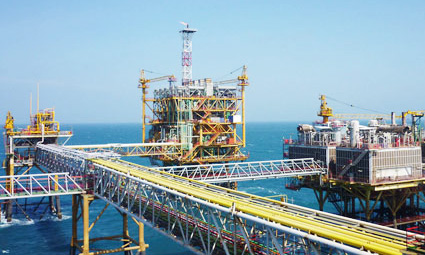Slumping oil market attracts attention

Do Chi Thanh, deputy general director of PetroVietnam (PVN), during a monthly meeting with the Ministry of Industry and Trade (MoIT) noted that if the price of oil dives below $30 a barrel, PVN may have to consider shutting down or suspending a number of its oil fields.
Thanh said that the plunging oil prices had an acute effect on the group’s revenue and profit targets. PVN’s revenue in January only met 74 per cent of its monthly target.
Previously, in order to cope with falling oil prices PVN designed/compiled several back-up plans for 2016, with scenarios covering prices ranging from $35-65 a barrel. At $65 a barrel, PVN’s consolidated revenues are expected to reach VND275.3 billion ($12.6 billion), with a VND22.8 trillion ($1.04 billion) post-tax profit. However, in case prices plummet to $30 a barrel, the expected consolidated revenues and post-tax profit would only be VND141 trillion ($6.46 billion) and VND10.4 trillion, respectively, half of the figures applicable to the scenario with $65 a barrel.
According to CEO Tu Thanh Nghia at Vietsovpetro (VSP), a joint-venture between PVN and Russia's Zarubezhneft, VSP’s production costs in 2015 sat at $23.7 a barrel, while its break-even cost was approximately $37 a barrel and its average selling price stood at $56 a barrel.
“When the selling price goes below $35 a barrel, or below our break-even cost, VSP may have to consider cutting production costs to below $20 a barrel to ensure profitability for both PVN and its Russian partner,” Nghia said.
PetroVietnam Exploration Production Corporation (PVEP)’s general director Ngo Huu Hai shared that PVEP’s average production cost and selling price were at $26.6 and $54 a barrel in 2015, making a raw profit of $18 a barrel. Factoring in a 20 per cent corporate income tax and other levies, the production cost added up to $45.5 a barrel, resulting in a net gain of $8.5 a barrel. If all taxes are calculated, however, the cost can hike up to $54.7 a barrel, bringing PVEP to produce at an actual loss.
Hai explained that as soon as oil has been extracted from the well, it is subject to tax right away, usually taking away around 45 per cent of the total oil volume.
At an oil price under $35 a barrel, there will only be a handful of wells in Vietnam capable of operating at a profit, such as Bach Ho, Hoang Long-Hoan Vu or Rang Dong.
While the shutting down of oil fields might be inevitable necessity for some companies, other investors are looking to invest in oil and gas, eyeing the slumping market as a good opportunity.
Bitexco Group and Sovico Holdings, for instance, are waiting for approval from the competent authorities to invest in the oil and gas sector.
PVN’s report noted that PVN has lately proposed the MoIT to approve its plan for Sovico Holdings to join its Block 16-1/14. Sovico Holdings has also expressed desire to participate/become a member of PVN’s Block.
The participation of Vietnamese private enterprises in the exploration and exploitation of oil and gas resources when the price is nearing a record low could be indicating a good business prospect for the sector.
“PVEP has once gone through tens of opportunities to be able to purchase a well at an exorbitant price amidst fierce competition. The current low price gives a good chance to negotiate a more favourable contract,” PVEN’s Hai said.
What the stars mean:
★ Poor ★ ★ Promising ★★★ Good ★★★★ Very good ★★★★★ Exceptional
Latest News
More News
- NAB Innovation Centre underscores Vietnam’s appeal for tech investment (January 30, 2026 | 11:16)
- Vietnam moves towards market-based fuel management with E10 rollout (January 30, 2026 | 11:10)
- Vietnam startup funding enters a period of capital reset (January 30, 2026 | 11:06)
- Vietnam strengthens public debt management with World Bank and IMF (January 30, 2026 | 11:00)
- PM inspects APEC 2027 project progress in An Giang province (January 29, 2026 | 09:00)
- Vietnam among the world’s top 15 trading nations (January 28, 2026 | 17:12)
- Vietnam accelerates preparations for arbitration centre linked to new financial hub (January 28, 2026 | 17:09)
- Vietnam's IPO market on recovery trajectory (January 28, 2026 | 17:04)
- Digital economy takes centre stage in Vietnam’s new growth model (January 28, 2026 | 11:43)
- EU Council president to visit Vietnam amid partnership upgrade (January 28, 2026 | 11:00)
















 Mobile Version
Mobile Version